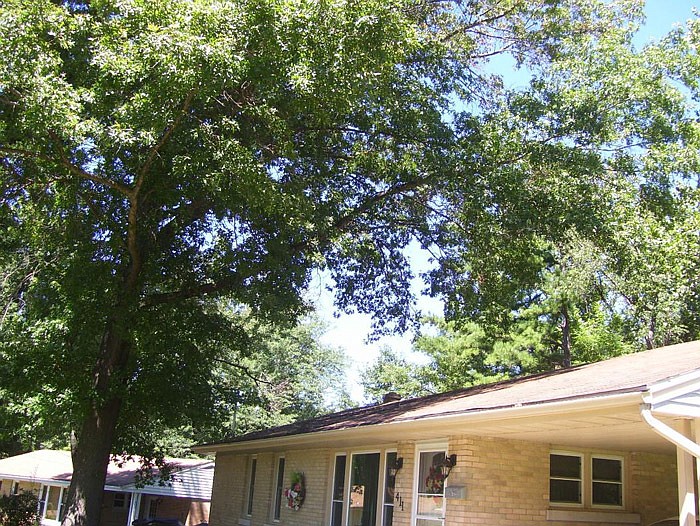Q. I'm concerned about this tree branch hanging over my house. I've called a few tree companies and have conflicting recommendations. What do you suggest?
A. Removal of just that branch would be good. Trees, hardwoods in particular, should be trimmed/pruned for three primary reasons - safety, tree health and aesthetics. That branch is a safety concern in high winds or snow/ice load. Unfortunately, the tree is somewhat neglected with regard to early shape planning and aesthetics. So just removing that branch would be the least expensive approach. There is little rational to remove the whole tree - especially since it provides shade that reduces air conditioning needs. It would be best to wait until the leaves have fallen to do this, unless you are quite concerned.
Q. This tree seems to have been hit by lightning (see photo). Will it survive? Should I do anything?
A. We decided to contact Missouri Department of Conservation on this issue. A forester there recommended doing nothing for now. Recovery from the strike depends mostly on its overall health, which from other photos looked good. Many times the tree will heal itself in time. Minimize any stress to it, like construction in that area or parking of vehicles. Painting of the open/bare wood won't help the tree any. However, remove any loose bark. Watering it this year or next if we have a significant dry spell (i.e., the three hot/dry weeks this past June) would be helpful.
Q. I've got these big, green caterpillars on my tomatoes. I keep picking them off, but I'm getting sick of it. What else might I do?
A. You would be describing either a tobacco or tomato hornworm. Spraying an insecticide is the most immediate way to reduce or eliminate them. The benefit of a spray is that it will get the very small caterpillars, which can be quite difficult to spot. There are two insecticides that are fairly specific to caterpillars, thus less toxic to the environment and humans. Most well known are Dipel and Thuricide, both using the same active ingredient (Bacillus thuringiensis). This is a naturally occurring microorganism that, upon ingesting, grows in the gut of the caterpillar and kills it. Another good product is by Bonide, with the "too descriptive to a fault" name of Borer, Bagworm, Leafminer and Tent Caterpillar Spray, which uses Spinosad for its effectiveness, a naturally occurring product derived from a soil microorganism. Either should protect the plant for about one week.
These caterpillars are laid by a very cool moth, from the sphynx moth group. Sometimes they are called hummingbird moths. Since they are so neat, some gardeners plant flowers to attract them, big tubular flowers like moonflowers, Datura or morning glories. Avoid having tomatoes near these types of flowers if practical.
Q. I missed putting down the preventative herbicide Preen earlier in my flower bed, which has gotten quite weedy. Will it do any good now?
A. I'll assume you mean Preen Garden Weed Preventer, as there are quite a few different Preen products, but this formulation is of widespread interest. The label says you can apply anytime around established desirable plants. It gives instructions for both mulch and bare soil. However, it only prevents weeds from germinating, so you have to first clean up those weeds. Once you have done that, we don't have much hot weather left to favor those fast growing summer weeds like foxtail, crabgrass or ragweed. So the Preen would really be of use to prevent winter annuals, which germinate in the fall then become apparent in the spring, like purple flowering henbit. For that, it would be useful.
Have a gardening question of your own? The Master Gardener Hotline is open from 12:30-4:30 p.m. Tuesday and Friday afternoons. Call 634-2824 or stop by the Cole County Extension Center at 2436 Tanner Bridge Road, or email your question to [email protected] for possible inclusion in a future "Ask a Master Gardener" column.


